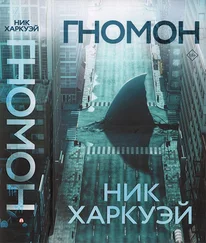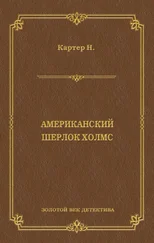‘I do like, Lester. I like very much. It’s bad down there.’
He thought of Sandrine, felt the boy somewhere behind him, the acuteness of his focus. ‘How bad?’
For answer, she unlimbered the camera and reversed it. In the grainy screen of the eyepiece and without sound, he saw the mission house in flames and a man lying bleeding on the lip of the fountain. Another man, walking by, paused for a moment and rolled him into the water. The bleeding man held himself up for a moment, and then looked straight at Hasp’s camera.
He lay down on his back in the water, and breathed out.
The other man watched for a while, and then walked away, vanishing into an angry crowd.
The Sergeant leaned away from the eyepiece. Kathy Hasp looked at him.
‘They’ll see what’s happening here, Lester.’
‘I know.’
‘They’ll see and they won’t like it and they’ll come up here like a fucking Frankenstein movie with torches and pitchforks and they’ll burn this place down with everyone inside. You’re making an opposition, someone they can get to.’
‘We’re not hurting anyone.’
She looked at him curiously. ‘You do know that never makes any difference, right?’
‘What will you do?’ he returned a little sharply.
She patted the camera without pride. ‘It’s all I can do.’
He nodded. ‘Same here.’ She winced in acknowledgement. Well, good. ‘Do you want to come inside? Get some shots of the before?’
‘Sure. We’ve got time.’
‘How much time?’
She thought about it. ‘Maybe an hour and a half before they set off. But they won’t walk it, not all of them. There’ll be trucks. You know there will.’
He hesitated. ‘We have some guns, you know. Some other stuff.’
‘You gonna use ’em?’
‘I’m a soldier.’ She knew he’d dodged the question, but she didn’t follow up. He suspected she wanted to run away, but that she wouldn’t because that would be worse. He wondered how often she felt that, if she just lived from one bloody awful obligation to another. A lot of the correspondents drank, or drugged, or fucked up a hurricane, and a lot of them did all of the above, but what they were addicted to was horror, and that was the thing they’d never kick.
She walked past him into the house.
He set the boy to showing Kathy Hasp around, made sure everyone knew Dirac was in charge if he himself could not be found, then slipped quietly away. He took a moment to wonder whether this was still the right thing to do, whether Sandrine was better off where she was. Yes, and no. Brighton House was defensible, if it came to it. Her own, these nights, was so much kindling.
The armoury corridor was long and very quiet. The Sergeant could hear all the noises from the rest of the house – people shuffling and settling, the sound of the Witch complaining about a lack of something or other, a child wailing, even quiet laughter – but they were far away. The corridor belonged to him and his footsteps.
He had locked the partition behind him and the closed space felt thick, as if he were going down the aisle of a great cathedral and at the far end his bride or his confession would be waiting for him.
The metal door resisted. He leaned on it and there was a brief moment of stasis before it swung open. He went inside and opened the burn bag. The mask was just as he had left it, a whisper of silica spray around the cheeks. It looked like a cast-off undergarment from a very particular sort of brothel. The front armour plate was perfect, the back one ruined.
He discarded the useless plate, selected another from store and slipped it home, then found a combat firefighting suit and put the bottom half on, added the armour and then the long coat over the top. He pulled on the utility belt, stuffing random items into the empty places: flare, truncheon, taser, hand-strobe, smoke canisters and anything else which would fit. On reflection, he reloaded the sharkpunch and tucked it away, then looked in the mirror. Without the mask and with the coat zipped up, he was just a rescue worker, just good old Lester come to help.
He slipped out of the side door into the garage shack, and saw Kathy Hasp’s motorcycle. On instinct, he walked over to it. The key was in the well under the saddle.
Two hundred metres beyond Brighton House along the coast road there was a track leading down to the sea. It was overgrown now – the tiny hamlet it had served having faded not in this most recent upheaval but long before, when the chemical men first set foot on the island with promises of wealth and modernity – but the baked earth remained solid underfoot. The Sergeant rolled the bike silently onto the path, and then stood for a moment in the dusk, scenting tomatoes on the wind.
This is the world , he thought. And I am in it .
He held the mask in his hands like a communion cup, and ducked his face to meet it. The moist interior surface sealed against his skin. The tomato smell faded, replaced by the antiseptic base note of the mask and a whisper of his own sweat.
He climbed aboard the motorcycle and started it up, then charged it out onto the road in one convulsive movement, waiting until he was pointed at the town of Beauville before turning on the lights. The nearest refugees flinched away from the sudden clap of sound, then ran from the road. No. Not the Quads. Me. He was seeing one face in ten, a brief impression as his eyes skipped from one to the next, but Jesus, there were a lot of them, on makeshift crutches and leaning on one another, bleeding and beaten and burned.
He must seem to come from nowhere, the clap of sound and then the light: a ghost rider – or so he hoped – like the ones in the song. He roared past them, down to the town and the flames.
The endless line of refugees flew by, occasional single faces sticking briefly in his vision, their desperation or fatigue or plain boredom filling his mind for an instant before being swallowed by the sound of the road and the certainty which he felt now.
This was rash. There was no cloud cover, no concealment. If NatProMan was watching, they would see him, they would be able to trace him back to the house – although the house was full now, he realised, rather than empty, and his address would yield nothing more than confusion. The refugees sheltered him even as he sheltered them.
He had learned from watching Shola’s body fall: a single man could not adequately defend himself except by attacking. If he had known that Shola’s killers – now ash on the wind, and falling probably on the ship which had ordered both their original mission and their subsequent destruction – if he had known that they were coming, he could have met them, stood them down, or beaten them before their attack could find its place. After they had begun was already too late, the shotgun blast tearing through the foppish silk shirt.
But tonight, in the same position almost exactly, he did know. There were killers preparing now, and they would come into his house to do murder.
He would go to Sandrine, and then he would see about the Quads.
He took the north road towards the shanty and left the refugees behind, the seemingly endless line of them and their need.
HE PASSED AROUND the edge of the town proper, where the fires were far between. The buildings were more cursory in the first place, tin roofs and breeze-block construction, poverty in the spliced power lines and the drainage ditches which were not quite open sewers. He saw stragglers from the riots, either fleeing or looking for something worth the trouble to destroy, and turned the bike into the cheek-by-jowl warren of the shanty. Immediately he heard shouting, veered towards it knowing it for trouble, for a wrong thing. Beauville, something inside him still insisted, was a good place. It was filled with good people. They were ordinary people, venal people, even stupid people, but they were rarely mean and this was beyond them, should be beyond them, should have stayed in the pit of wretched possibility for the island even in its dying. It had been created out of malice.
Читать дальше

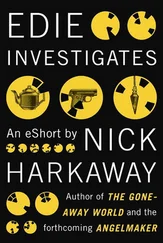
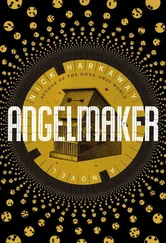
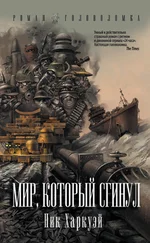


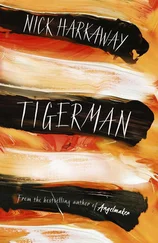
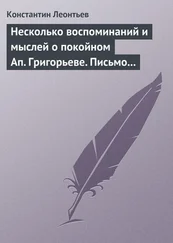
![Ник Харкуэй - Гномон [litres]](/books/400023/nik-harkuej-gnomon-litres-thumb.webp)
